- Home
- Lauren Oliver
The Spindlers Page 11
The Spindlers Read online
Page 11
More nightmare creatures, with mouths looped around with seaweed, like some horrible stitching, and long fingers, rotting.
Liza, Liza, Liza, they chanted, in voices that were as soft as a snake’s hiss. Come join us, Liza. Live forever, Liza. Play forever, Liza.
No, she tried to scream; but the weight of the water was everywhere: the noise, the heat, the horrible faces and places and things. And the last of her air went; the pain in her lungs was huge. She swallowed, gulping a choking sand, a choking dust, choking—
She was choking—
Then suddenly, just like that, the creatures let go, and Liza was lifted; she broke the surface of the river and gulped in air, sobbing and grateful, as the swift currents released her. Mirabella, sopping wet, heaved her out of the water and onto the rocky banks. Liza was shivering and sobbing, coughing up water. Mirabella had lost her wig, her shawl, and the last of her skirt. The rat stood, skinny, naked, trembling.
The scawgs were nowhere to be seen.
“What did I tell you?” Mirabella cried shrilly, but before she could get any further, Liza had thrown her arms around the rat’s shoulders.
“Oh, Mirabella!” she cried, clinging tightly to the shivering rat. “Thank you, thank you, thank you!”
Mirabella’s body went rigid: Remember that she had never, not once in her whole life, been hugged.
Liza’s teeth were chattering, though not from the cold. Her mind was still clouded with the river’s roiling visions; she was sure she would have died had she been submerged any longer.
“You saved my life.” Liza was too grateful to care about the taste of wet rat fur in her mouth. “You are the bravest, truest rat I’ve ever known. No. You are the bravest, truest friend I’ve ever had.”
A tiny spasm passed through Mirabella’s body, but Liza didn’t notice.
She didn’t notice, either, the clicking sounds from all around them, the tic-tic-tic of tiny nails against the rocks.
She pulled away from Mirabella but kept her hands on the rat’s bony shoulders, stooping just a little so she could stare the rat directly in her eyes. “And I want you to know, Mirabella, that you are beautiful. You are beautiful just like this, as you are, with no makeup or clothes or anything.”
Liza was not just saying this to be nice. The rat did appear beautiful to her just then, with her large black eyes and long silken whiskers, and curled gray fur, still dripping water.
Mirabella gave a short cry, almost of pain, and to Liza’s surprise, tears sprang up in the rat’s eyes.
Believing the rat must be overwhelmed, Liza moved once again to hug her.
“That’s okay,” she said kindly. “You don’t have to say anything.”
Mirabella gave another mangled cry. “It’s not okay!” She broke free of Liza’s arms. “Oh, Miss Liza. I’m sorry. I’m so, so sorry.”
“Sorry?” Liza laughed. “What do you have to be sorry …” But the laughter, and the words, dried up in Liza’s throat.
By then she had heard it: the unmistakable tic-tic-tic of the nails. Fear seized her, and her body went all at once to ice. She did not consciously think of turning around, but then she found herself turning; everything seemed to happen in slow motion.
“Well, well, well.” The voice behind her was no louder than a whisper, like the rustle of dry leaves in autumn. “We’ve been expecting you for quite some time now.”
Liza’s heart stopped: spindlers, dozens and dozens of them, crowded black shapes massed along the rocks, watched her amusedly with their crescent eyes. The spindler that had spoken was the size of a large house cat and covered all over in prickly black hair. Even its hands were covered in hair. Its fingernails were long, sharp, and painted red.
“You have my brother,” Liza managed to croak out.
“Perhaps,” the spindler said. It had a wide mouth, and two long, curved pincers that made it seem as though it was constantly grinning. The spindler turned toward Mirabella. “You’ve done your job well, rat. Admirably well. The queen will be pleased. She will be sure to remember your services to us after we have feasted, when all the world Below is ours.”
Next to Liza, Mirabella was miserably chewing her tail. Liza felt a blackness rise inside her, a wave of cold fury.
“You—you’re on their side?” She was shaking so badly she had to ball her hands against her thighs.
Mirabella let out a pathetic and hapless squeak, which was as good as a full confession of guilt.
“And all this time you pretended to be helping me, and really you were just leading me here to—to be trapped?”
The spindler let out a hollow laugh, and the other spindlers joined in, so the air was full of a low rustling: It made Liza think of rain pounding against black winter branches. “You didn’t really think the rat offered to help out of the goodness of her heart, did you?” Contempt was obvious in the spindler’s tone. “Don’t they teach you anything Above?”
“I trusted you,” Liza said in a bare whisper. Mirabella groaned and clamped her hands over her ears.
“Everyone knows you can’t trust a rat.” The spindler gestured for one of its many companions to come forward. “Give the slimy creature its reward.”
One of the other spindlers scuttled forward. In its two front hands it held a small mirrored compact made of cheap plastic, like the kind Liza’s aunt Virginia got at department stores when she spent more than twenty-five dollars on face creams and perfume.
This was too much.
“A mirror?” Liza felt the heat rushing back; she found herself wishing, cruelly, that she still had her broom. Now she would gladly bop Mirabella over the head. “You traded me for a cheap plastic mirror?”
Mirabella still had her paws over her ears and was shaking her head back and forth. “Bad, bad, bad, bad, bad rat,” she muttered. “Can’t trust a dirty, filthy rat. No good for anything.”
Liza took a step forward, and Mirabella squeaked with fear. She brought her paws defensively in front of her chest, as though worried Liza was going to attack her. But Liza could only say, “I wanted to be your friend. I thought we were friends. Do you understand that?”
Mirabella froze. Her mouth fell open, but no words or sounds emerged.
“All right, rat,” the spindler said, with unconcealed contempt. “You’ve done your job. Take your trinket, and be off with you. Unless you, too, would like to stay for the Feasts …?”
Again the titter went up from the other spindlers.
Mirabella took up the mirror, squeezing it tightly in both paws. But she kept her eyes on Liza, and her whiskers quivered. She closed her mouth and opened it again. Still nothing.
Liza felt herself seized on all sides by tiny, clammy hands, as the spindlers crowded around her. But she was too sad to care; she couldn’t think of anything but Mirabella’s betrayal. Now she really was all alone in the underworld. She had absolutely no one to help her.
“To the queen,” rasped the largest spindler.
Liza allowed herself to be pushed forward by the seething mass of spider-people. At the last second, she turned around. Mirabella was still standing, frozen, by the edge of the River of Knowledge, clutching her mirror.
“I would have given you all the mirrors you wanted,” Liza said sadly.
“Miss Liza—” Mirabella started to say, but Liza did not hear the rest of her words. The pressure of all those tiny, terrible hands turned her left, around a bend in the road, and the rat disappeared from view.
Chapter 17
THE QUEEN OF THE SPINDLERS
These were the nests, the home of the spindlers, and the heart of the world Below. Every rock was covered in quivering gray spiderwebs, and among them thousands of spindlers of all different sizes—some as small as regular spiders, some as large as poodles—watched Liza with their unblinking green eyes, and clicked their nails against the rocks, and made hooting sounds of glee as she passed.
Above her, a series of webs was strung like a canopy. Spindlers scurried above her hea
d, taunting her, and try as she did to appear courageous, she could not stop herself from shaking. She imaged spindlers dropping on her from above, snaking their nails down her back.
Beyond the webs, the moribats were circling and calling to one another shrilly; and next to her something enormous—it must have been the size of a golf cart—scuttled along the rocks, and the air was full of shadows. Liza gave up on being brave and allowed herself to feel afraid.
After a short while they came to a place where the rocks had, over time, been chiseled away by the digging, scratching motion of hundreds of thousands of sharp nails: It was an enormous cavern, covered so completely with webs it looked as though a powdery gray snow had fallen. Columns of rock rose up from the cavern floor; between them were slung more silvery threads, on which masses of moribats were swinging, and preening their featherless bodies, and watching everything with milky white eyes.
The spindlers all around Liza dispersed, scattering into the dark corners of the cavern: all except the largest one, who remained next to Liza, keeping one of its six hands firmly planted on her back.
“We have brought the girl, my queen,” it called out into the murky darkness in front of them.
“Very good,” came the horrible, grating reply. To Liza it sounded like a body being dragged slowly over gravel.
Then the darkness in front of them began to move, and take shape; eight legs, each the size of tree trunks, unfolded, and the thing shook itself, and stood. Liza found herself trembling in its enormous shadow: So this was the queen.
Liza had vastly underestimated the queen’s size. She was as large as a house—a small house, but a house nonetheless. Her jointed and hair-covered limbs tapered to hands that seemed horribly out of place; they were the hands of a beauty, with long, thin fingers and sharp, curved nails, painted a swirling opal color. Her eyes were a glittering purple, dark crescents set like stones above her sprawling mouth, and her glistening, venom-tipped fangs.
Even the spindler that had escorted Liza thus far seemed terrified. When the queen, with a flick of one of her eight wrists, gestured dismissively for it to leave, the spindler scuttled gratefully off into a corner. Liza was left alone.
“So”—the queen loomed over Liza—“you have come to see the nests.”
“I have come to rescue my brother’s soul,” Liza said, wishing that her voice would not shake so badly.
“Ah, your brother.” The queen smiled—if the monstrous pulling apart of its mouth could be called a smile—and gave another dismissive flick of her wrist. “The world is full of brothers and sisters, mothers, fathers, friends. Everyone means something to someone else. It is extremely tiresome to keep track of. The rat brought you here?”
Thinking of Mirabella made Liza’s anger flare again. “The rat tricked me,” she said. “I thought she was trying to help. I thought she was a friend.”
“A rat is a rat, and will always be a rat, and nothing but. Haven’t you learned anything yet, my dear? We are never anything but what we were born to be.” As the queen of the spindlers spoke, she seemed to shrink: smaller and smaller and smaller, until she was no larger than a kitten. And then, just like that, she sprang. Instinctively Liza ducked. But the queen had missed her, landing soundlessly on one of the pillars just to Liza’s left; then she zigzagged to a pillar on Liza’s right, leaving a thin, glistening strand of silver thread between them. Liza saw that she was weaving.
“You see?” the queen said, as she slid and skated through the air, leaving silver threads as she went. “I may be the queen of the spindlers—the most powerful creature Below—but in the end I must do what I was born to do. I must make webs.”
Liza watched, amazed. The queen moved rapidly, a dark blur: and in no time at all an enormous web had taken shape in front of Liza’s eyes, full of loops and twists and patterns that reminded her of the most delicate lace. It would have been beautiful if it were not for the queen, who settled in the middle of the web, watching Liza with her intelligent eyes. Liza was not comforted by the queen’s smallness; somehow she was even more terrifying this way. She seemed quicker now, more likely to attack.
“Give me my brother back.” Liza forced the words out past the fear.
The queen smiled, displaying a set of glistening fangs. “Ah, that I won’t do. We need him, you know. We need all of them. I fear my friends are getting very hungry.”
A deep chill went through Liza’s body, as the spindlers massed in the dark recesses of the cavern tittered and rustled, and clicked their fangs together, as though they were already preparing to feast.
Liza took refuge in one of her favorite phrases. “It’s not fair,” she said. “Patrick’s soul doesn’t belong to you. You have to give it back.”
“Fair?” The queen swayed a little in the middle of her shimmering web, seemingly amused. “My dear, misguided child. Nothing could be more fair. Possession is in ownership, after all, and victory is in the spoils. I wanted Patrick’s soul, so I took it, and because I took it, it belongs to me.”
Liza was growing more muddled by the second. “But it’s not right,” she insisted.
“Right, wrong,” the queen scoffed. “Haven’t you learned that there is no such thing? There is only what you are prepared to take, and what you are prepared to give.”
“Fine. Then I’ll just take his soul back,” Liza said with more confidence than she felt.
“Ah, now we’re getting somewhere.” The queen of the spindlers descended a little farther on the web, gripping the threads with her long fingers, so that she and Liza were at eye level. “You are talking about a kind of contest?”
“I—I guess so,” Liza stammered.
“A test of wills. I, of course, have always liked tests, hurdles, riddles, puzzles, traps, and snares.” As if to prove this, at that moment a moribat—weaving carelessly through the cavern—collided with the queen’s web. Instantly it became entangled. The more it fluttered, the more it became hopelessly entwined in the threads of the web, until the queen reached out, snatched it up in two of her hands, and dropped the struggling creature into her mouth.
“What was I saying?” the queen mumbled through a mouthful of moribat. A small white bone slipped from the queen’s mouth and clattered to the ground, and Liza had to turn away to keep from being sick.
“You want your brother’s soul. I do not want to part with it. But if you manage to take it from me … well, then, I suppose it belongs to you. Doesn’t that seem fair?”
“I guess so,” Liza said, unconvinced. She felt as though the queen was weaving webs inside her brain, making everything complex and confused.
“Good, good.” The queen, having swallowed the last of the moribat, licked her fingers in a satisfied way. “Then how about a few small tests? If you pass, you can have your brother back. If you fail, I get to keep his soul.”
Around her, the other spindlers scuttled closer, watching and judging her response. Crescent eyes winked at her from the dark.
Liza’s heart was beating very fast. “What do I have to do?”
“The Web of Souls lies at the end of the corridor. To get to it, you must pass through three rooms.” She gestured to a vaulted space in the rocks at the end of the cavern: the entrance to the first room, presumably. “If you can get to your brother, you can have him.”
“That’s it?” Liza asked. It sounded too easy; she was sure that the queen had some other trick up one hairy arm. “You swear?”
“Word of honor.” The queen raised a slender hand, grinning. Around her came tittering sounds: The other spindlers were laughing. Tic-tic-tic went their nails on the stone, as they inched closer, waiting for Liza’s reaction, waiting to see what she would do.
Liza felt fear needling in her stomach. Wrong, a voice said inside her. She knew the queen could not be trusted.
On the other hand, she had no choice.
“All right,” Liza said at last. “I’ll go.”
“Excellent,” the queen said. She dropped lightly from he
r web to the ground. Then, perceiving the fallen bone of the moribat, she scooped it up quickly and chomped it down greedily. Liza could not prevent herself from shivering.
“This way, dearie,” the queen said. Liza followed her, ducking under the enormous web that now filled half the cavern, careful to avoid its silken strands. She imagined herself caught, like the moribat, struggling in the threads.
The other spindlers came out of the darkness and followed Liza and the queen at a safe distance. She could feel them, all around her, a slow compression: It felt like someone had reached out and put a hand in her stomach and squeezed. She was afraid.
At the end of the cavern was a long tunnel of darkness; at the far end, a plain wooden door was set in the stone. Liza’s mouth felt very dry.
It’s just dark, she thought. That’s the only reason I’m so afraid. There is nothing else to be scared of. She wished she had a lumer-lumpen with her now.
Then she thought, Being afraid of the dark is for babies. She thought of Patrick curled up next to her in the night, as they made a game of finding shadow-shapes on the walls, and felt slightly better.
“Whenever you’re ready,” the queen said, with a flourish of a hand. Despite the politeness of her tone, her eyes glowed unpleasantly.
Liza took one shuffling step forward into the dark, and then another. She kept her eyes fixed on the wooden door ahead of her. One more step, and then another. The air was damp, warm, and close; she almost couldn’t breathe. Too quickly she had reached the door, and she lifted one hand to its rusted brass handle.
“Oh, one more thing I forgot to mention.”
Liza whipped around at the sound of the queen’s voice. The queen had swelled again, just a little, so she now almost entirely blocked the entrance to the dark corridor. Her eyes glowed brighter and brighter; they had gone from purple to a bright bloodred. Around her and between her legs, the other spindlers were pressing close; fangs dripping, they watched Liza’s progress closely.

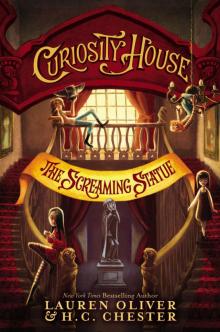 The Screaming Statue
The Screaming Statue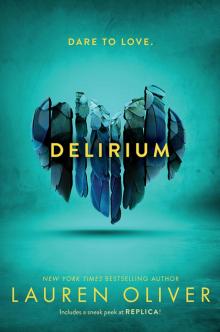 Delirium
Delirium Before I Fall
Before I Fall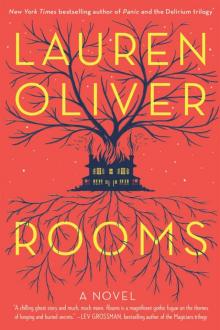 Rooms
Rooms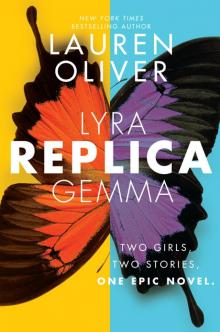 Replica
Replica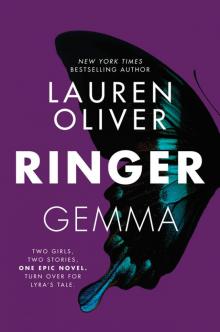 Ringer
Ringer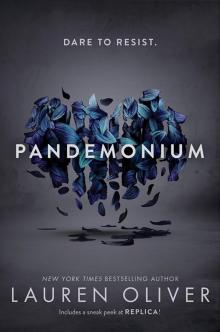 Pandemonium
Pandemonium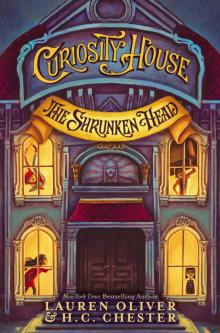 The Shrunken Head
The Shrunken Head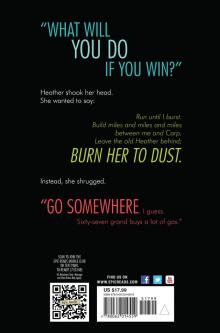 Panic
Panic Requiem
Requiem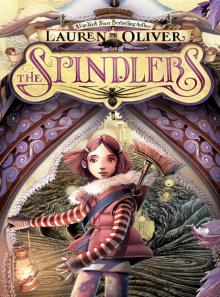 The Spindlers
The Spindlers Annabel
Annabel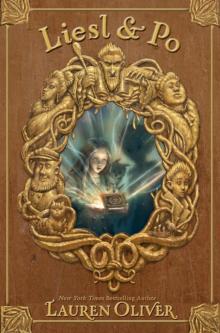 Liesl & Po
Liesl & Po Raven
Raven Alex
Alex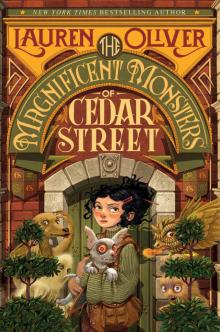 The Magnificent Monsters of Cedar Street
The Magnificent Monsters of Cedar Street Vanishing Girls
Vanishing Girls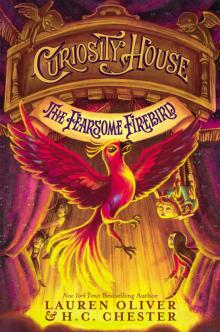 The Fearsome Firebird
The Fearsome Firebird Raven: A Delirium Short Story
Raven: A Delirium Short Story Annabel: A Delirium Short Story
Annabel: A Delirium Short Story Hana: A Delirium Short Story
Hana: A Delirium Short Story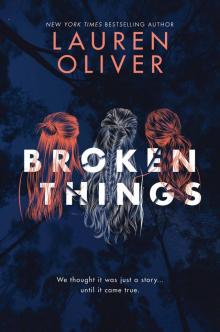 Broken Things
Broken Things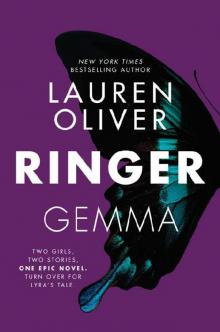 Ringer (Replica)
Ringer (Replica) Alex (delirium)
Alex (delirium)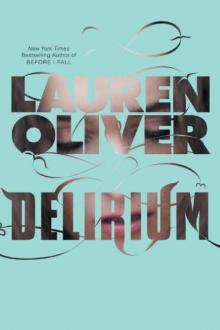 Delirium dt-1
Delirium dt-1